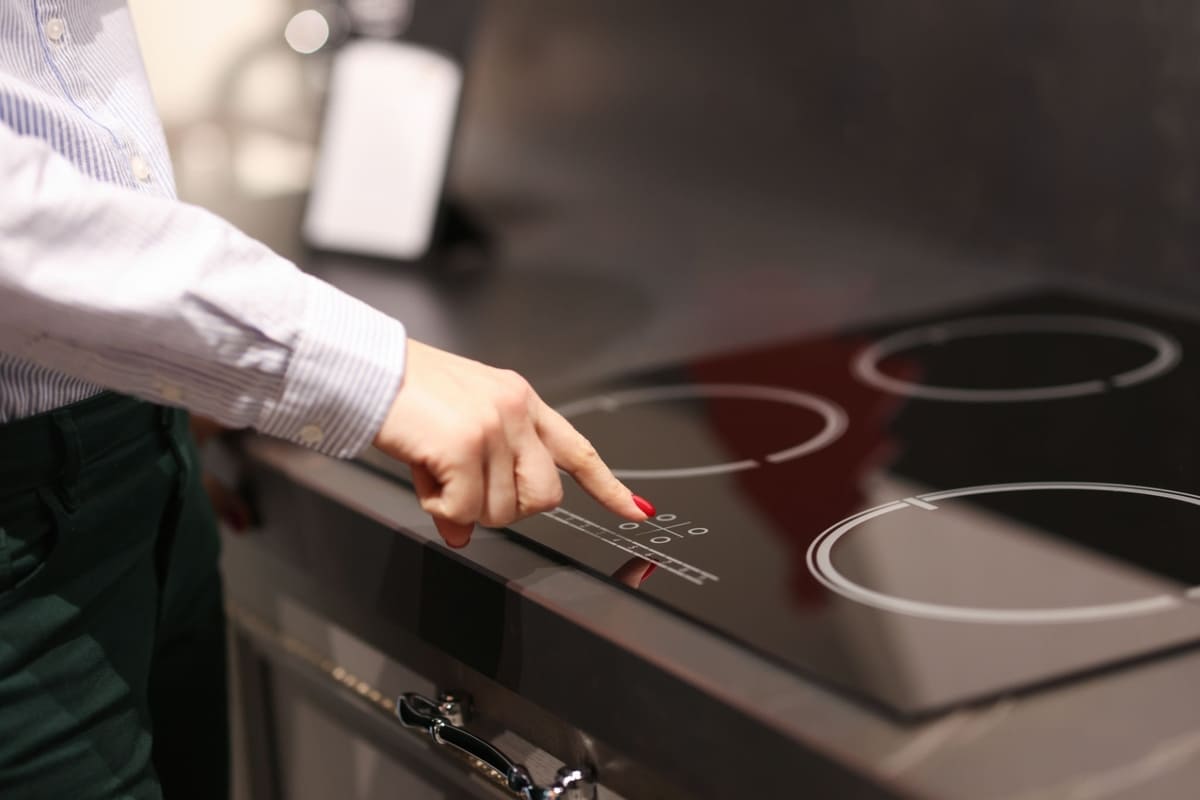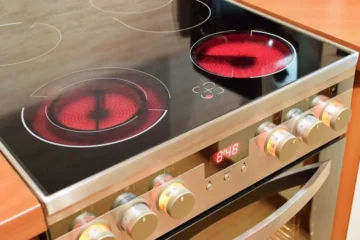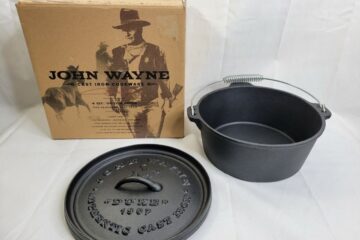An induction stove is a type of stove that uses electromagnetic energy to heat up cookware. Unlike gas or electric stoves, induction stoves heat up the cookware directly, without heating up the surrounding air. This makes them a more energy-efficient and precise option for cooking.
Induction stoves work by creating a magnetic field that induces an electrical current in the cookware. The current then heats up the cookware, which in turn heats up the food inside. Because the heat is generated directly in the cookware, induction stoves are able to heat up food faster and more evenly than other types of stoves. They are also safer to use, as the stove top itself does not get hot, reducing the risk of burns.
What Is Induction Cooking?
Induction cooking is a method of cooking that uses electromagnetic energy to heat cookware and cook food. Unlike gas or electric stovetops, induction cooktops do not use an open flame or a heated coil to transfer heat to the cookware. Instead, induction cooktops use a copper coil that is located beneath the cooking surface to generate an electromagnetic field. This field then transfers heat directly to the cookware, which heats up and cooks the food inside.
How Does an Induction Stove Work?
An induction stove works by using an alternating current (AC) to create a magnetic field in the copper coil beneath the cooking surface. When a compatible piece of cookware is placed on the cooking surface, the magnetic field induces an electric current in the cookware. This electric current then generates heat, which cooks the food inside the cookware.
Induction stovetops can only heat up cookware that is made of ferromagnetic materials, such as cast iron or stainless steel. Cookware made of aluminum, copper, or glass will not work on an induction cooktop, as they are not magnetic.
Advantages of an Induction Stove
Induction stovetops offer several advantages over traditional gas or electric stovetops. Some of these advantages include:
- Faster cooking times: Induction stovetops heat up cookware much faster than gas or electric stovetops, which can save time when cooking meals.
- Energy efficiency: Induction stovetops are more energy-efficient than gas or electric stovetops, as they transfer heat directly to the cookware and do not waste energy heating up the air around the cookware.
- Safer to use: Induction stovetops are safer to use than gas or electric stovetops, as they do not have an open flame or a heated coil that can cause burns or fires.
Disadvantages of an Induction Stove
While induction stovetops offer several advantages, there are also some disadvantages to consider. Some of these disadvantages include:
- Higher cost: Induction stovetops are generally more expensive than gas or electric stovetops, as they require more advanced technology to operate.
- Limited cookware options: Induction stovetops can only heat up cookware that is made of ferromagnetic materials, which can limit the types of cookware that can be used.
- Noise: Some induction stovetops can produce a humming noise when in use, which can be bothersome to some users.
Choosing an Induction Stove
When looking to purchase an induction stove, there are a few factors to consider to ensure that you get the best one for your needs. Here are some important things to keep in mind:
Factors to Consider
Cookware Compatibility
One of the most important things to consider when choosing an induction stove is the compatibility of your cookware. Induction stoves require cookware made of ferromagnetic materials, such as cast iron or stainless steel. Aluminum, copper, and glass cookware will not work with induction stoves. Make sure that your current cookware is compatible with induction stoves, or be prepared to purchase new cookware.
Size
Induction stoves come in various sizes, so it’s important to choose one that fits your kitchen and cooking needs. Consider the size of your kitchen and the space you have available for the stove, as well as the number of burners you need for your cooking habits.
Power
Induction stoves come with different power levels, so it’s important to choose one that meets your cooking needs. Higher wattage stoves will heat up faster and cook food quicker, while lower wattage stoves will take longer to heat up and cook food.
Popular Brands
When it comes to choosing a brand for your induction stove, there are several popular options to consider:
Bosch
Bosch is a well-known brand that offers a variety of induction stoves at different price points. Their stoves are known for their sleek design and advanced features, such as automatic pan recognition and touch controls.
Samsung
Samsung offers a range of induction stoves that are known for their high-quality performance and safety features. Their stoves come with features such as child locks and automatic shut-off, making them a great choice for families with children.
GE
GE is another popular brand that offers a variety of induction stoves at different price points. Their stoves are known for their reliability and advanced features, such as WiFi connectivity and voice control.
Installing an Induction Stove
Installing an induction stove may seem like a daunting task, but it is actually a relatively simple process. Here are the requirements and steps to follow.
Requirements
Before beginning the installation process, make sure you have the following:
- An induction stove
- Compatible cookware
- An electrical outlet
- A licensed electrician
- A circuit breaker
Installation Process
- Turn off the power supply to the circuit breaker.
- Remove the old stove and disconnect it from the electrical outlet.
- Install the circuit breaker for the induction stove, if necessary.
- Connect the induction stove to the electrical outlet.
- Test the stove to ensure it is working properly.
- Place compatible cookware on the stove and turn it on to test its heating capabilities.
It is important to note that induction stoves require compatible cookware, as they use an electromagnetic charge to create heat directly within the cookware. Cookware made of cast iron, magnetic stainless steel, and some types of aluminum are typically compatible.
Maintaining an Induction Stove
Keeping an induction stove in good condition is essential to ensure that it continues to work efficiently. Here are some tips to help maintain an induction stove:
Cleaning Tips
Cleaning an induction stove is relatively easy. Here are some tips to help keep it clean:
- Always unplug the stove before cleaning.
- Use a soft cloth or sponge with a mild detergent to clean the surface.
- Avoid using abrasive cleaners or steel wool, as they can scratch the surface.
- Clean up spills as soon as possible to prevent them from staining the surface.
- Use a glass cleaner to remove any stubborn stains or burnt-on food.
Common Issues and Solutions
Although induction stoves are generally reliable, there are some common issues that can occur. Here are some solutions to these issues:
- The stove does not heat up: Check that the power is on and that the stove is plugged in. If the problem persists, contact a professional technician.
- The cookware does not work: Induction stoves only work with compatible cookware. Check that the cookware you are using is suitable for use with an induction stove.
- The surface is scratched: Avoid using abrasive cleaners or steel wool, as they can scratch the surface. If the surface is scratched, contact a professional technician for advice.
Conclusion
In conclusion, induction stoves are a great option for anyone looking for a fast, efficient, and safe way to cook. They use electromagnetic energy to heat up the cookware directly, which means they heat up faster and more evenly than traditional stovetops. They are also very energy-efficient, which can save you money on your energy bills in the long run.
While induction stoves can be more expensive than traditional stovetops, they are worth the investment if you are looking for a high-quality cooking experience. They are also very easy to clean, since the cooktop itself does not get hot.
One thing to keep in mind is that not all cookware is compatible with induction stoves. You will need to make sure that your pots and pans are made of a magnetic material, such as cast iron or stainless steel, in order to use them on an induction stove.
Overall, if you are looking for a fast, efficient, and safe way to cook, an induction stove is definitely worth considering. With their advanced technology and numerous benefits, they are sure to revolutionize the way you cook in your kitchen.



